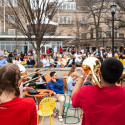Amasino receives Alexander von Humboldt Award
Richard M. Amasino, a plant molecular biologist in the Department of Biochemistry, has been named the recipient of the 1999 Alexander von Humboldt Award. Amasino will receive the award at a ceremony Oct. 28 in Madison.
Amasino is being recognized for his studies of processes that regulate flowering time in plants and the mechanisms that control senescence, the process by which leaves age and drop from plants. Those findings help explain how plants regulate important activities; they have far-reaching implications for agriculture.
The Alexander von Humboldt Award is one of the most prestigious awards for agricultural research in the United States. Named in honor of the 19th-century German naturalist and geographer, the award is presented each year to an individual considered to have made the most significant contribution to agriculture in the previous five years.
Amasino and his colleagues recently identified a key gene that determines whether plants behave as annuals or biennials. Annuals produce flowers their first summer; biennials, such as cabbage, carrots, onions and beets, produce flowers the summer after they’ve been exposed to prolonged cold.
Amasino and his group also created a gene that blocks senescence. They demonstrated that plants with that gene produced more plant tissue and seeds than control plants. Scientists at universities and companies around the world are following up on the discovery, which has the potential to improve agricultural crops, such as alfalfa, corn, soybean and vegetables, as well as ornamental plants and cut flowers.
Amasino has been on the UW–Madison faculty since 1985, and has received other honors including a Shaw Scholar Award and a Presidential Young Investigator Award.
Dr. Alfred Toepfer, an internationally known grain merchant from Hamburg, Germany, established the Alexander von Humboldt Foundation in New York City in 1969. Under Toepfer’s leadership, the foundation’s board of trustees established the Alexander von Humboldt Award in 1974. The award includes a $15,000 cash prize, a medallion, a certificate and a $5,000 scholarship for a student to study agriculture in Germany.
Amasino is the third professor from the College of Agricultural and Life Sciences to receive the award since its inception in 1975. Neal First, an animal scientist, received the award in 1987 and Winston Brill, a former professor of bacteriology, received the award in 1979.



